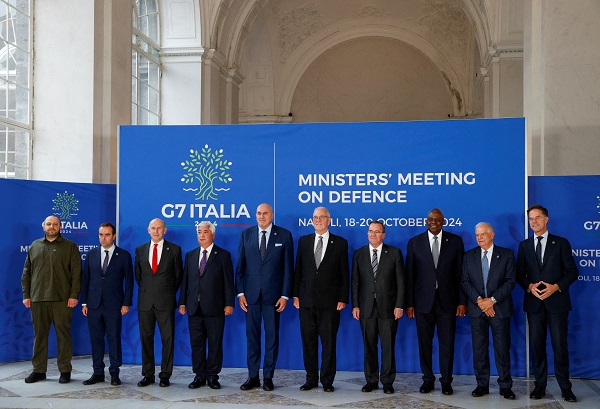 Defence ministers of Ukraine, France, the UK, Japan, Italy, Canada, Germany and the US, with EU foreign policy chief Josep Borrell and NATO Secretary General Mark Rutte pose for a photo during their G7 meeting in Naples, Italy, 19 October 2024;
Credit: Reuters/Ciro De Luca/File Photo
Defence ministers of Ukraine, France, the UK, Japan, Italy, Canada, Germany and the US, with EU foreign policy chief Josep Borrell and NATO Secretary General Mark Rutte pose for a photo during their G7 meeting in Naples, Italy, 19 October 2024;
Credit: Reuters/Ciro De Luca/File Photo
ROME/WASHINGTON (Reuters) - On Friday 25 October 2024, leaders of the Group of Seven wealthy democracies reached consensus on delivery of some $50 billion in loans to Ukraine backed by the earnings from frozen Russian sovereign assets starting as early as December.
"These loans will be serviced and repaid by future flows of extraordinary revenues stemming from the immobilisation of Russian Sovereign Assets," the G7 statement said.
"Our aim is to begin disbursing the funds by the end of the year," said the statement, which was released as global finance chiefs were meeting in Washington for the International Monetary Fund and World Bank annual meetings.
An accompanying statement from G7 finance ministers said that the loans would be disbursed through a series of bilateral loans, starting as soon as 1 December 2024 and continuing through the end of 2027 "in installments that will reflect Ukraine’s urgent financing needs."
Each bilateral loan would enter into force no later than 30 June 2025, which provides some timing flexibility for G7 members to arrange details.
The statement announcing the principles and some technical details did not provide specific amounts for the bilateral loans but said additional details will be issued in a term sheet to be distributed in coming days.
Election timing
On Wednesday 23 October 2024, the US announced it would give Ukraine a $20 billion loan during December, timing meant to shield the loan funds from a potential claw-back should Republican presidential candidate Donald Trump win the November US election.
Trump has vowed to "get out" of Ukraine's war with Russia. The next US president would not take office until January 2025.
Another $20 billion loan is expected to come from the EU, home to G7 members Germany, France and Italy, with the remaining $10 billion split between Canada, the UK and Japan.
"We will stand by Ukraine for as long as it takes," the finance ministers' statement said.
The loans will be disbursed through multiple channels, including a Macro-Financial Assistance Loan from the EU, the IMF's Multi-Donor Administered Account for Ukraine and a newly created Financial Intermediary Fund for Ukraine at the World Bank, the statement said.
G7 pledge
Friday's announcement of the "extraordinary revenue acceleration loans" makes good on an easement reached in June 2024 by G7 leaders during their annual summit in southern Italy to harness earnings from frozen Russian assets to aid Ukraine, a deal that left many technical details to be hammered out.
Some €260 billion in Russian assets such as central bank reserves were frozen under sanctions imposed following Moscow's invasion of Ukraine in February 2022.
The vast majority of those assets are held in Euroclear, a Belgium-based central securities depository, making the European Union a key player in any plan to make use of the assets.
"The G7 remains steadfast in its solidarity to support Ukraine's fight for freedom, and its recovery and reconstruction," the G7 leaders' statement said, adding that "time is not on [Russian] President Putin's side."








